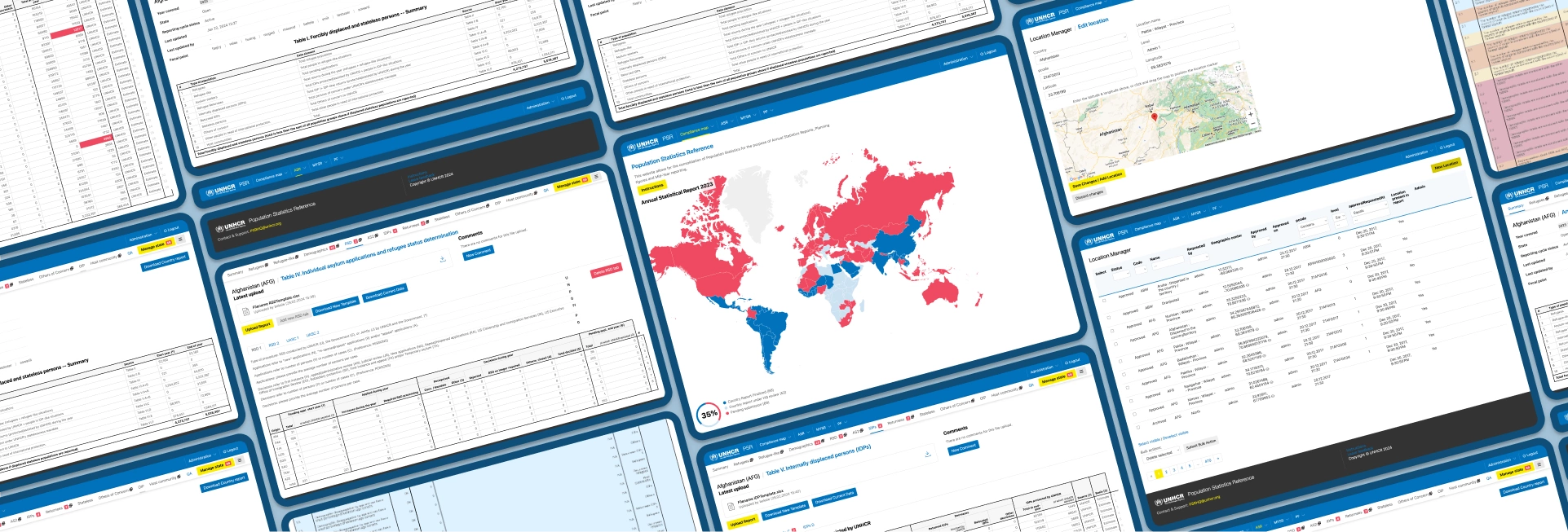Tarek Abou Chabake

UNHCR stands at the forefront of global efforts to safeguard the rights and well-being of refugees and internally displaced persons. In partnership with UNHCR, the Population Statistics Reference (PSR) tool emerges as a pivotal tool, modernising the way refugee data is collected, validated, and utilized.
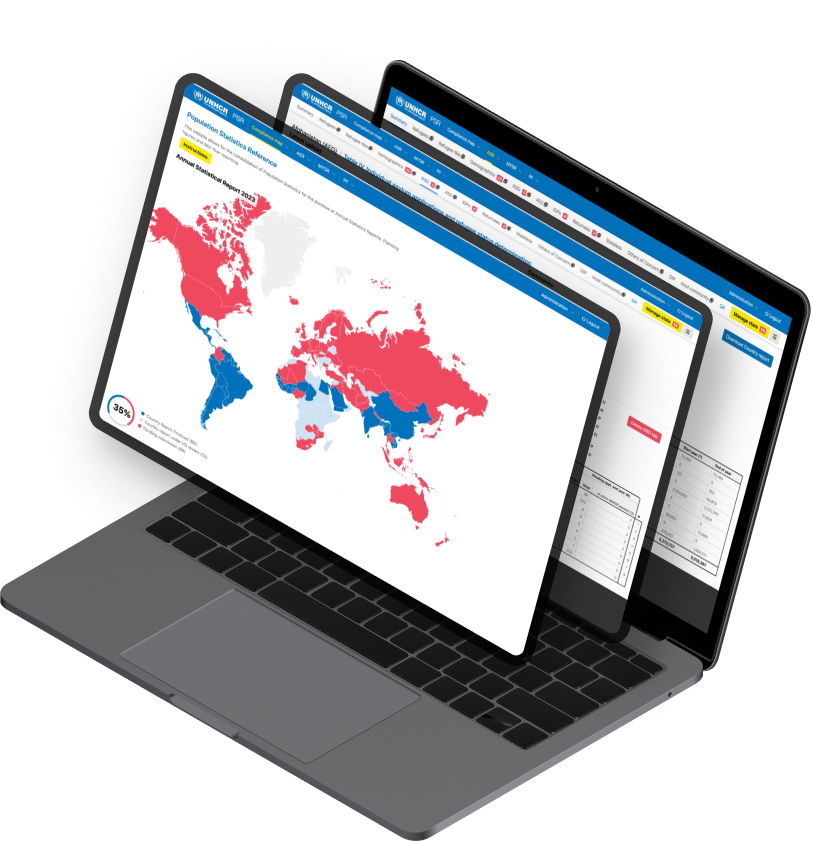

The United Nations High Commissioner for Refugees (UNHCR) stands at the forefront of global efforts to protect and support refugees. Faced with the escalating challenges of displacement crises, UNHCR's mission to ensure the rights and well-being of refugees has never been more critical. In response to the growing demand for accurate and timely data on refugee populations, the need for a robust, digital solution became apparent. Traditional methods of data collection were becoming increasingly inadequate to manage the complex and dynamic nature of global refugee data.
Enter the Population Statistics Reference (PSR) tool. Developed in collaboration with UNHCR, the PSR tool represents a groundbreaking step in the digital transformation of refugee data management. Designed to collect, review, and validate refugee data across 187 countries, PSR leverages advanced technology to enhance the accuracy, efficiency, and accessibility of critical population statistics. By integrating traditional data collection methods with modern digital capabilities, the tool not only streamlines data management processes but also significantly improves the quality and reliability of refugee statistics.


In response to the critical need for a comprehensive and efficient data management system, the Population Statistics Reference (PSR) tool was conceived as a transformative solution. This innovative platform was specifically designed to digitalize and centralize the process of collecting, reviewing, and validating refugee data on a global scale. By transitioning from traditional methods to a more sophisticated, technology-driven approach, PSR has significantly enhanced the ability of UNHCR to manage population statistics with unprecedented accuracy and efficiency.
At the core of the PSR tool's development is a robust stack of modern technologies, chosen for their reliability, scalability, and performance. The application is built on PHP, leveraging the Symfony framework to ensure a structured, efficient, and flexible development environment. Data storage and management are handled by MySQL, providing a powerful and secure database system for handling vast amounts of sensitive data.
To guarantee the highest levels of availability and manageability, the PSR tool is hosted on Amazon Web Services (AWS) infrastructure. This choice ensures scalable computing capacity, robust security features, and comprehensive data recovery options, enabling the tool to meet the demanding requirements of global data collection and analysis tasks.
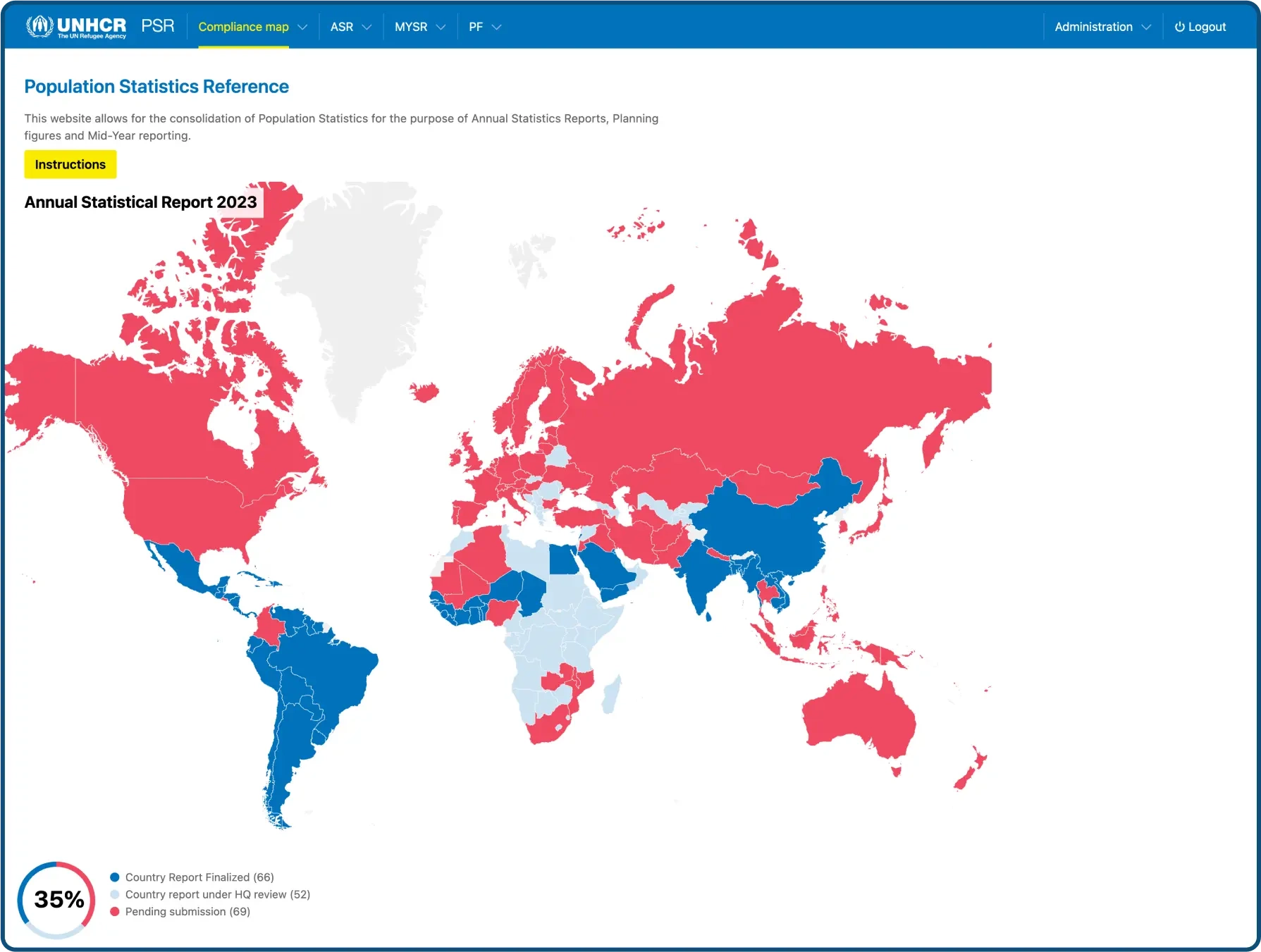
The Population Statistics Reference (PSR) tool, a sophisticated digital platform, elevates the management of refugee data to new heights. This section delves deeper into its comprehensive data management capabilities, spotlighting the integration of user management, audit trails, geographical data handling, and country-specific management.
User Management
Central to the PSR tool's effectiveness is its advanced user management system. This feature allows for the granular control of access rights and permissions, tailored to the unique roles and responsibilities of each user. From data entry personnel to high-level analysts, the system ensures that users have access to the appropriate tools and data necessary for their work. This hierarchical access control is crucial for maintaining the integrity of sensitive data, ensuring that only authorized personnel can perform specific actions within the system.
Audit Trails
The PSR tool incorporates a robust audit trail system, meticulously recording every interaction with the data. This includes data submissions, edits, reviews, and approvals, providing a transparent and traceable history of all actions taken within the system. Audit trails are vital for accountability, enabling administrators to review changes, identify who made specific modifications, and understand the context of those changes. This level of oversight is essential for maintaining data integrity and trust in the system’s outputs.
Location and Country Management
With its global scope, the PSR tool features a comprehensive location manager and country management functionality. The location manager allows for the detailed handling of GIS data, ensuring accurate geographical representation of refugee statistics. This capability is critical for planning, analysis, and reporting purposes, allowing for nuanced insights into refugee distributions and trends.
Country management functionality offers customized data collection, review, and validation processes tailored to the specific needs and contexts of each country. This allows for the nuanced handling of data across different regions, accommodating variations in data availability, reporting standards, and operational priorities. It also facilitates a more organized and efficient review process, enabling country-specific adjustments and feedback to refine and enhance the quality of data collected.
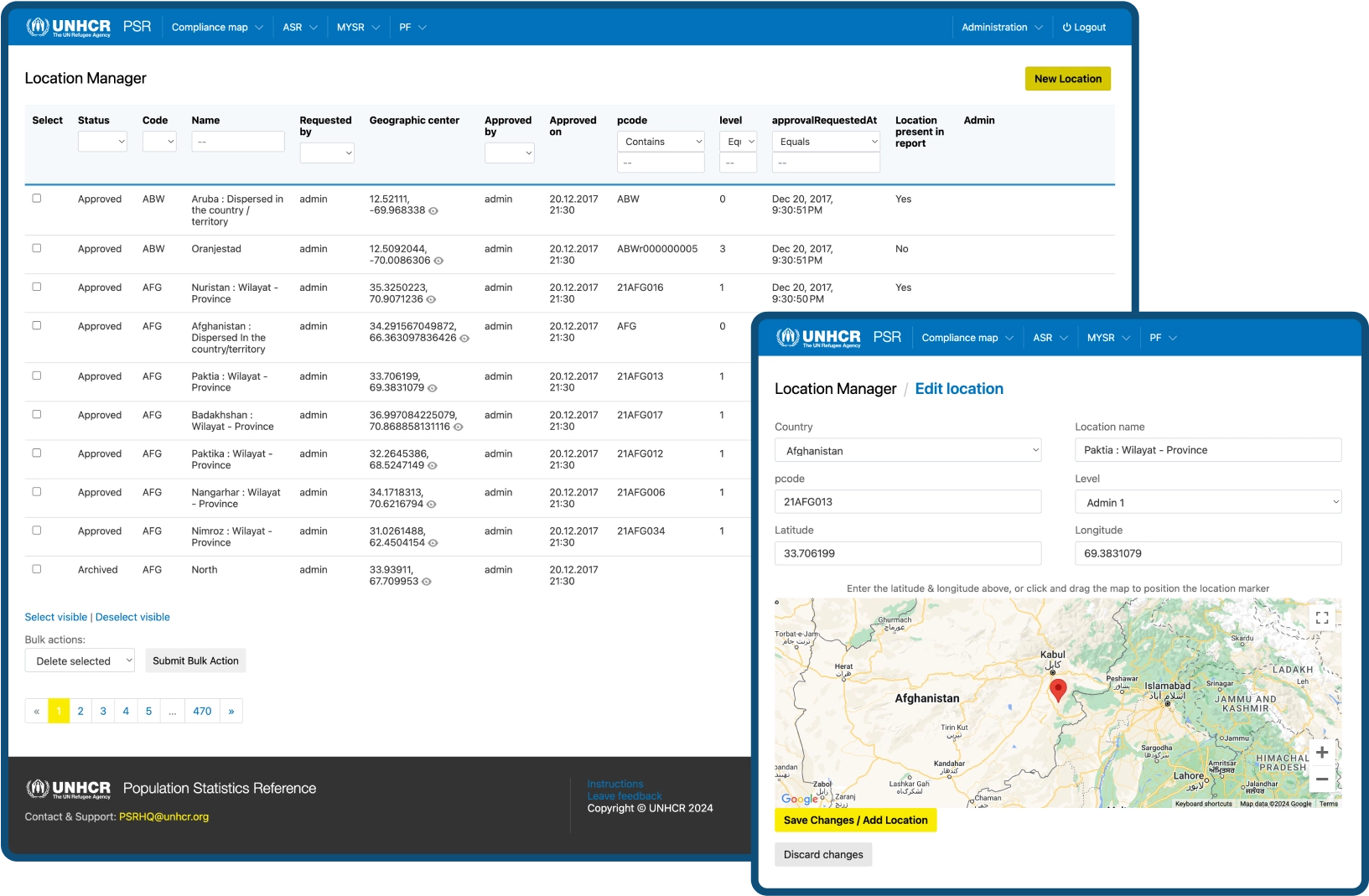
The PSR tool's comprehensive data validation and integrity features are crucial for maintaining the quality and trustworthiness of refugee data. Through a blend of automated checks, peer reviews, and adherence to rigorous data standards, the tool ensures that the data used to inform decisions and policies is accurate, reliable, and reflective of the true scale and scope of global refugee situations. This commitment to data integrity is essential for enabling UNHCR to fulfill its mission with the highest levels of effectiveness and accountability.
Automated and Peer Review Validation Processes
The PSR tool employs a multi-tiered approach to data validation, combining automated checks with peer review processes. Upon submission, data is subjected to an automated validation system that immediately identifies and flags discrepancies, inconsistencies, or deviations from established data standards and formats. This immediate feedback mechanism ensures that the most common errors are caught and corrected at the earliest stage, enhancing the efficiency of the data collection process.
In addition to automated validation, the PSR tool facilitates a rigorous peer review process. This process allows for human oversight of data submissions, enabling reviewers to assess the context, accuracy, and completeness of the data. Peer reviewers, typically experts in data analysis and refugee affairs, provide an additional layer of scrutiny, ensuring that data not only meets technical standards but also accurately reflects the on-the-ground realities faced by refugee populations.
Integration with External Systems
The integrity of refugee data is further enhanced by the PSR tool’s capability to integrate with external systems for data dissemination and ingestion. This integration allows for the cross-verification of data points, enriching the PSR dataset with external sources and ensuring consistency across different data management platforms. Whether it's updating GIS data or incorporating statistics from partner organizations, this interconnected approach bolsters the reliability of the data collected and maintained within the PSR tool.
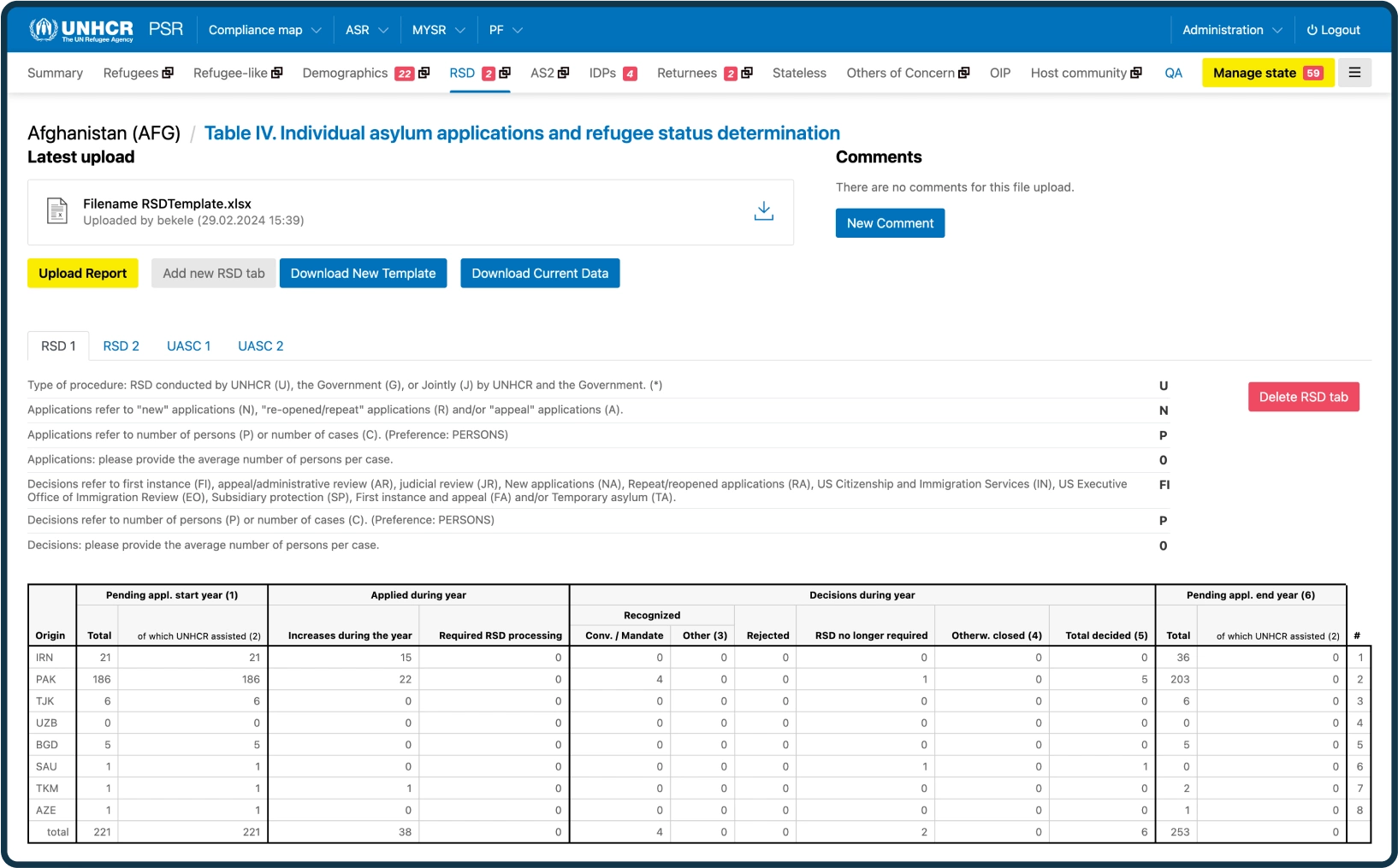
In the intricate landscape of global humanitarian efforts, the accuracy and accessibility of data play pivotal roles in shaping policies, driving decisions, and mobilizing support. The Population Statistics Reference (PSR) tool, through its rigorous processes of data collection, validation, and review, culminates its efforts in the publication of significant outputs that influence and inform both public understanding and policy formulation on a global scale.
The Gateway to Global Trends
Upon thorough review and processing, the refined data harvested via the PSR tool is instrumental in the creation of the "Global Trends" report. This annual publication, produced by UNHCR, serves as a comprehensive overview of patterns, challenges, and conditions affecting refugees, internally displaced persons, and stateless individuals worldwide. It synthesizes the validated data into actionable insights, highlighting the scale of displacement, the conditions within host countries, and the evolving dynamics of refugee movements. The "Global Trends" report is not just a reflection of the past and present; it is a beacon guiding future humanitarian efforts and policy directions, leveraging the depth and integrity of the data provided by the PSR tool.
The UNHCR Refugee Data Finder: A Digital Milestone
The journey of data transformation and utilization reaches another milestone with the UNHCR Refugee Data Finder, an innovative project that brings refugee statistics to the fingertips of the global community. Accessible at UNHCR Refugee Statistics, this digital platform presents an interactive, user-friendly interface that allows users to explore, understand, and analyze refugee data. From policymakers to researchers, and the general public, the Refugee Data Finder democratizes access to information, enabling a deeper understanding of the refugee crisis and fostering a more informed and compassionate global response.
If you want to read more info on how we built the UNHCR Refugee Data Finder, you can read the case study here!
